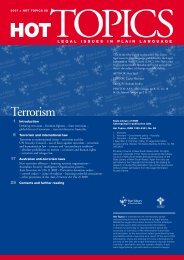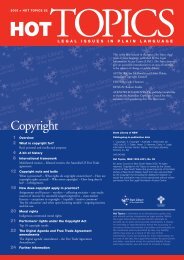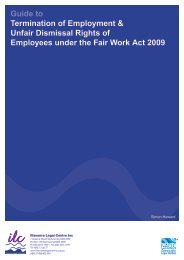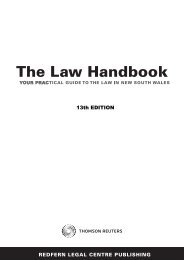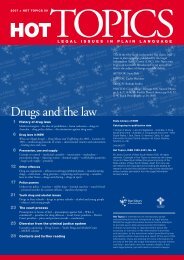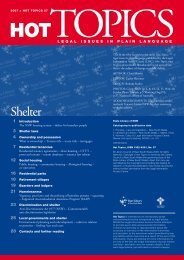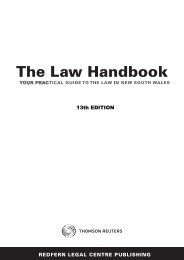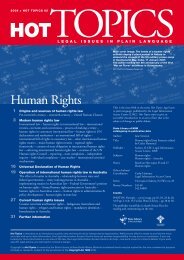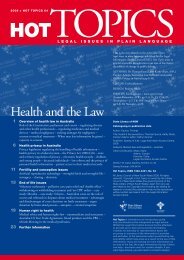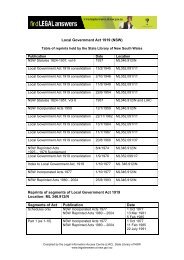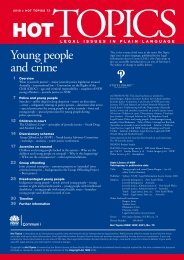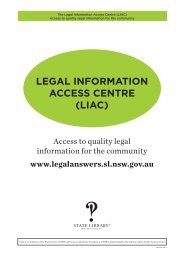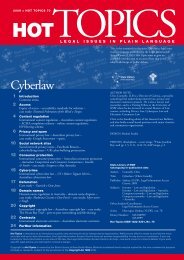Aboriginal people and the law - Legal Information Access Centre
Aboriginal people and the law - Legal Information Access Centre
Aboriginal people and the law - Legal Information Access Centre
You also want an ePaper? Increase the reach of your titles
YUMPU automatically turns print PDFs into web optimized ePapers that Google loves.
40 The Law H<strong>and</strong>book[2.10] Historical legacyTo underst<strong>and</strong> <strong>the</strong> relationship betweenIndigenous <strong>people</strong> <strong>and</strong> <strong>the</strong> Australian legalsystem, it is essential to appreciate somethingof <strong>the</strong> history of that relationship.Which <strong>law</strong>?There are two legal systems for many <strong>Aboriginal</strong> <strong>and</strong>Torres Strait Isl<strong>and</strong>er <strong>people</strong>.The most obvious is <strong>the</strong> Australian legal system to whichall Australians are subject (with some differences betweenstates <strong>and</strong> territories). The o<strong>the</strong>r body of <strong>law</strong> thatapplies to <strong>Aboriginal</strong> <strong>and</strong> Torres Strait Isl<strong>and</strong>er <strong>people</strong> is<strong>the</strong>ir own systems of customary <strong>law</strong>, beyond <strong>the</strong> <strong>law</strong>senacted by parliament or developed by <strong>the</strong> courts. TheHigh Court has only since <strong>the</strong> Mabo decision in 1992(Mabo v Queensl<strong>and</strong> (No 2) (1992) 175 CLR 1) recognisedthat Indigenous <strong>law</strong>s survived invasion by <strong>the</strong> British <strong>and</strong>continue to <strong>the</strong> present time. So far this recognition hasonly been applied to <strong>the</strong> ownership <strong>and</strong> use of l<strong>and</strong> <strong>and</strong>waters, but it could conceivably extend to o<strong>the</strong>r areas.[2.20] The issue ofsovereigntyIndigenous <strong>people</strong> in Australia never cededsovereignty of <strong>the</strong> l<strong>and</strong>s comprising <strong>the</strong>Australian continent to <strong>the</strong> British Crown –that is, not one of <strong>the</strong> 600 or more clangroups (defined by dialect) ever gave upsovereignty over <strong>the</strong>ir traditional l<strong>and</strong>s.Indigenous <strong>people</strong> argue that <strong>the</strong> Crown’sclaim to sovereignty is not sustainable underinternational <strong>law</strong>. However, in Coe v Commonwealth(1979) 53 ALJR 403 <strong>the</strong> HighCourt said that Australian courts were notcapable of deciding <strong>the</strong> issue of sovereignty,which meant that Indigenous Australianswould have to seek a ruling in international<strong>law</strong> on <strong>the</strong> legality of <strong>the</strong> way in which <strong>the</strong>British government gained sovereignty overAustralia. The international courts are not,however, designed for what amounts tosecessionist action by Indigenous <strong>people</strong>s oro<strong>the</strong>rs seeking to roll back colonialism. Theymay only hear matters between “nationstates”, <strong>and</strong> no <strong>Aboriginal</strong> <strong>and</strong> Torres StraitIsl<strong>and</strong>er group in Australia has that status.Indigenous <strong>people</strong> are left to seek remediesfor <strong>the</strong>ir dispossession under <strong>the</strong> domestic<strong>law</strong>s of Australia <strong>and</strong> through politicalactions.Recourse to <strong>the</strong> United NationsWhere <strong>the</strong>re has been a breach of an international treatyor convention, Indigenous <strong>people</strong> may be able to bringan individual or group application before <strong>the</strong> UnitedNations Human Rights Committee; for example mostrecently in 2007 in an application brought to <strong>the</strong>Committee in relation to <strong>the</strong> Commonwealth Government'sEmergency Intervention in <strong>the</strong> Nor<strong>the</strong>rn Territory<strong>and</strong> earlier in 1998, regarding <strong>the</strong> effect of <strong>the</strong> amendmentto <strong>the</strong> Native Title Act 1993 (Cth) (The Ten PointPlan).Under <strong>the</strong> International Covenant on Civil <strong>and</strong> PoliticalRights, which Australia has signed, <strong>the</strong> Committee canhear complaints from Australian citizens where:• <strong>the</strong> violation occurred on or after 25 December 1991,<strong>and</strong>• <strong>the</strong> complainant has exhausted all available domesticremedies.



